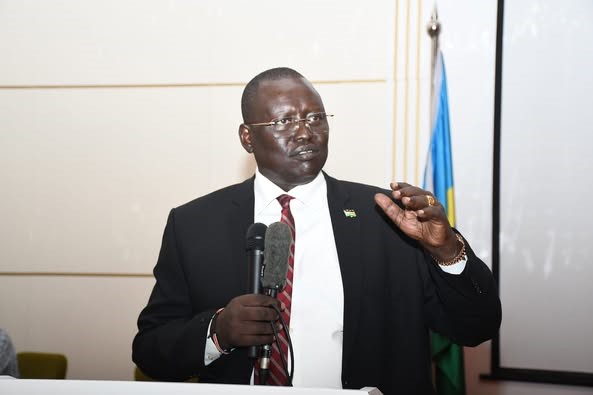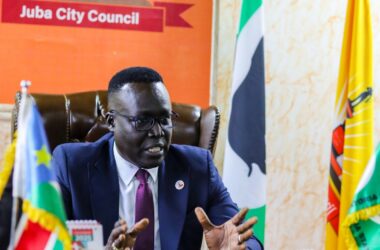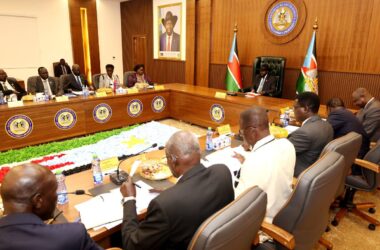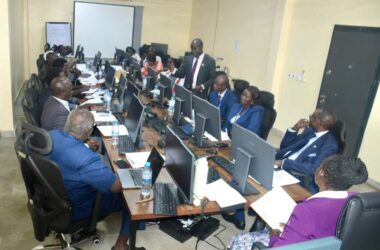By Yiep Joseph
South Sudan Revenue Authority (SSRA) clarifies that the 2024/2025 Financial Act did not increase taxes on essential commodities such as food and fuel.
Addressing journalists on Friday, the Commissioner General of South Sudan Revenue Authority, Simon Akuei Deng warned traders against hiking prices of essential commodities.
During an engagement with the business community in Juba, the Revenue Authority boss hinted that the new taxes do not affect essential commodities.
kuei’s engagement came at a time the market prices continue to increase, coupled with a report of protests by traders and transporters at Nimule border point, due to new taxes.
The Commissioner General of Revenue Authority emphasized the need for the public and traders to understand the financial act, for ease of operationalization.
He revealed that the 2024/2025 Financial Act did not increase tax on essential commodities.
“All the food commodities, all the essential commodities, maize flour, Azam, fuel, and oil, name them; they are not part of this bill. Their taxes have not been increased; they are as according to the 2022/2023 financial act, so nothing has been touched.” Akuei said.
He added that the taxes were increase on goods already in the country, like fish, as well as non-essentials like spirit alcohol.
“The only thing that has been raised in this are two major things: goods that are already present in South Sudan and one of them is fish produce in the Nile, bottled water, and the spirit (alcohol) has been raised,” he said.
The commissioner general, however, revealed that the exchange rate of the taxes is to be calculated from the current bank rate, adding it as the only change in the 2024/2025 financial bill.
“The only thing that has change sis the fact that this act and i read the exchange rate should be fixed inline with bank of South Sudan circular that is the only touchable thing in this act” he expressed.
“In the 2024/2025 financial act, the rate is according to the central bank rate. This is the most important thing that has changed in this act; otherwise, the whole act is very far,” he added.
Akuei noted that South Sudan remains and continues to charge the lowest taxes in the East Africa Region.
“Having the financial act of this 2024/2025 South Sudan remain the lowest country that has raised taxes, you go to Uganda, go to Kenya, go to Tanzania, and all these other countries are very high,” he said.
“And I had mentioned this: how much is V8 in Juba, USD 120,000, 130,000 How much is V8 in Nairobi? USD 230,000, 225,000, because it is 100% taxed there, but here it is only 35%, he added.
He expressed that Revenue Authority would remain committed to engaging the citizens to understand the new taxes.
Recently, Central Equatoria Chairperson of Chamber of Commerce expressed worry over implementation of the new tax rates in the 2024/2025 Financial Bill.
As prices are already soaring, additional costs could push the country into hyperinflation, leaving citizens struggling to make ends meet.
In an interview, Robert Pitia, chairperson of the Chamber of Commerce for Central Equatoria State, warned that the increased tax rates implemented in the 2024/2025 fiscal year could trigger a sharp rise in prices, further straining the already fragile economy.
“Higher tax rates will never improve the economy of any country; it creates hyperinflation. Also, we have issues with our currency, and we also depend on goods outside the country,” he said.
He added that such taxes, besides the increment of prices that affect the normal citizens, discouraged investors who may intend to put their resources into the country’s economy.
This week, South Sudan Revenue Authorities informed stakeholders of the operationalization of FY 2024/2025.
Under the new tax system, a broad range of goods and services, including imported goods, locally manufactured products, hotel and restaurant services, and telecommunications, will be subject to an 18% sales tax.




